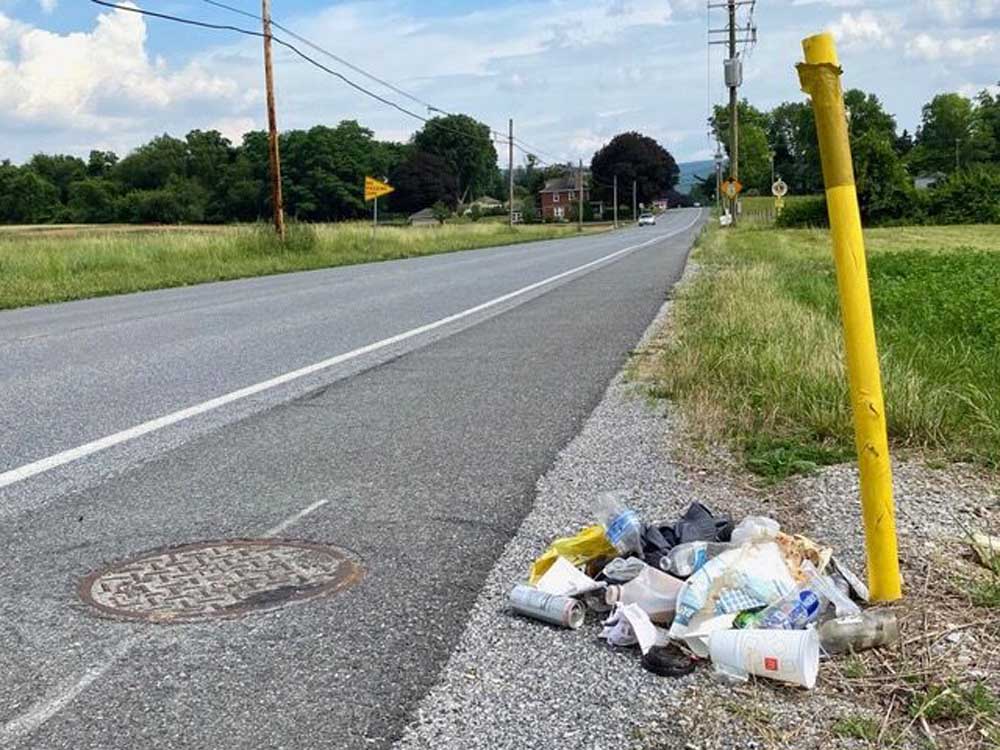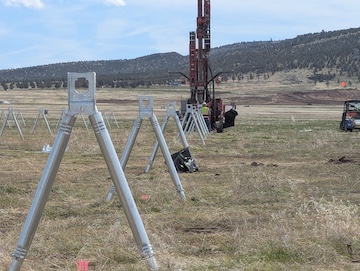Commentary: In praise of the Bottle Bill
Published 1:00 am Wednesday, July 7, 2021

- Trash collected recently along an eight-mile stretch of Forge Road on the way to Boiling Springs in Pennsylvania
Fifty years ago Oregon enacted the first “container deposit legislation” in the country. Basically a cash incentive for litter control, Oregonians valued the scenic natural beauty of the state — and voted to keep it that way for generations to come.
Count your blessings folks. After almost 40 years in Central Oregon, I moved to Pennsylvania last fall, a state with no container deposit legislation — and, to date, no plan to fix peoples’ littering habits.
State officials do recognize the problem. According to the Pennsylvania Department of Environmental Protection’s (DEP) web site “Pennsylvania has a littering habit.”
Over the years it’s become so bad that, in 2018, DEP, along with PennDOT (Department of Transportation) and Keep Pennsylvania Beautiful (KPB) sponsored the 2018-2019 Pennsylvania Litter Research Study, the first litter data report in more than 20 years.
On-the-ground litter counts in 180 locations and a phone survey of 500 residents statewide showed the full extent of the problem. Here are some of the findings.
- There was an estimated 502 million pieces of litter on Pennsylvania’s roads.
- Local roads had an average of about 1,030 litter items per mile. About 76 percent of respondents said littering reduces property values, negatively affects tourism and business, raises taxes due to clean-up, ends up in waterways, and is an environmental problem. About half of respondents said people litter because they don’t care — or there’s no conveniently placed trash can.
Half don’t care? I almost lost my mind when I read this statistic.
A runner and road cyclist, I immediately witnessed the extent of the local problem daily here in Carlisle, my new home. But I see the problem through my Oregon lens. So I asked someone else who’s up close and personal with local roads.
Linda Reilly is the Assistant Manager at the Appalachian Running Company in downtown Carlisle. Reilly helps organize weekly group runs which begin at the store. “We see quite a bit of cans, bottles, and trash — especially along many of the main roads like High Street, Forge Road, even some of the parks,” said Reilly.
Makes one wonder, post-DEP study, what’s being done, if anything, to change Pennsylvania’s littering habit?
Deb Klenotic, Deputy Communications Director with DEP, recently provided some hope that the problem is being addressed and a plan is being made.
“DEP, PennDOT, and Keep Pennsylvania Beautiful are coordinating an initiative to develop a littering prevention plan in Pennsylvania,” said Klenotic. “Bottom line, it’s an effort to shift our approach to litter away from primarily cleanup to primarily littering prevention. As litter continues to pile up, state agencies and municipalities just can’t keep up with the costs of cleanup.”
There are four working groups in the littering prevention initiative. The groups are education and outreach, infrastructure, regulation and enforcement, and partnerships.
After a pandemic-related delay, the working groups, consisting of local government, community, and business leaders from around the state, started working last month.
“Over the rest of the spring and into the summer they’re going to review the findings and recommendations of two Pennsylvania-specific research studies that DEP, PennDOT, and Keep Pennsylvania Beautiful commissioned in 2019,” said Klenotic. “By the end of summer, they’re going to develop a draft plan of recommended strategies tailored to Pennsylvania, and DEP, PennDOT, and KPB will review for finalization by the end of this year.”
In the meantime, Governor Wolf has been encouraging residents this spring to help reduce litter by joining the statewide “Pick Up Pennsylvania” campaign about community cleanups.
“DEP, PennDOT and KPB have partnered to support these local litter cleanup volunteer events for about 20 years,” said Klenotic. “Many thousands of Pennsylvanians have participated.”
While this may be true, from my perspective, one spring cleanup does not solve Pennsylvania’s problem.
So what can be learned from Oregon’s experience?
In 1971, bottles/cans made up about 40% of litter in Oregon. The Oregon Department of Environmental Quality reported that, by 1979 it dropped to 6%.
As a reminder, Oregon’s bottle bill requires people to pay a $0.10 container deposit when they buy all beverage containers three liters or less in size, except distilled liquor, wine, dairy or plant-based milk, and infant formula.
Consumers can return the empty containers to stores and redemption centers and receive the $0.10 refund for each container returned.
The deposit refund can be a boon to cash-strapped consumers (you get your $0.60 back on a six-pack when you return the empties) and a windfall for charities when consumers donate their recyclables to their cause.
“The Bottle Bill law has been an iconic symbol of Oregon’s love of natural beauty and conservation, and fight against litter and the throwaway mentality,” states The Oregon Department of Environmental Quality on its web site.
Ah, the throwaway mentality. Personally, I believe that’s the cause of Pennsylvania’s roadside trash problem.
But hold on. Politicians will surely recognize and solve the problem, right?
In the last 20 years there have been two legislative efforts to introduce container deposit legislation in Pennsylvania. In 2009 Republican State Sen. John Rafferty sponsored Senate Bill 855.
It “died in committee” and was referred to the Senate Environmental Resources and Energy Committee.
Ah, but all was not lost. Fast forward to October 2019 when PA House Bill 1322 was sponsored by then Democratic Representative Wendy Ullman.
Guess what happened? It died in Committee and was referred, this time, to the House Finance Committee.
Two bills never to be heard from again. So legislation-wise Pennsylvania bottle bills have been non-starters.
How lucrative can refundable containers be to a nonprofit? The Brightside Animal Center and Thrift Store in Redmond, Ore., a community of about 30,000 people, has benefitted tremendously over the years.
“Our wonderful volunteers sort the cans and bottles that arrive from our eight donation locations around Redmond. A recycler in a big semi comes once a week to pick them up,” said Patricia Bowling, Director of Accounting. “In 2019 we grossed about $100,000, netting about $75,000 after expenses.”
I asked Jenn Vanderau, Director of Communications with the Cumberland Valley Animal Shelter (CVAS) in Pennsylvania, whether a refundable bottle/can deposit program might benefit CVAS.
“We currently have a drop-off area for aluminum cans at the shelter where people provide us their empty cans and then we take them to be recycled here in Franklin County,” said Vanderau. “It’s quite a nice little fundraiser for us, so I can definitely see how a bottle and can law could be a real boon to non-profit organizations as well as help the environment.”
Personal story. On my runs here in Carlisle I’ve picked up and carried back to my home recycling bin about 400 containers — cans and bottles that, if each had a $0.10 deposit, would have netted about $40. With container deposit legislation I could have donated the $40 to a local pet shelter/humane society here in Pennsylvania.
And if a quarter of the population of Carlisle (about 5,000 people) did the same thing — we’re talking $200,000! Think of all the deserving Carlisle nonprofits that would love to have donations like that right now.
So, would grocers and beverage distributors in Pennsylvania cooperate, as they do in Oregon, to ensure less roadside litter while decreasing the amount of bottles and cans that get dumped in landfills?
But maybe more importantly, what will it take to get everyone, residents and businesses alike, to truly embrace the state’s message of Keep Pennsylvania Beautiful?
I’m hoping that an environmental awakening, much like Oregon had in 1971, happens here in Pennsylvania. But I’m not holding my breath.
Take a moment and thank a local legislator for the bottle bill. It will remind them how important it is to you, the environment, and the state’s economy.





